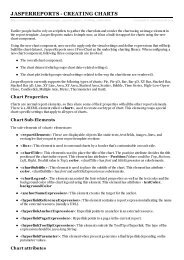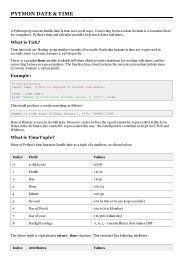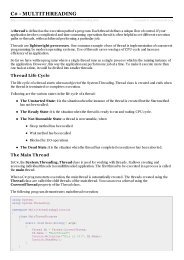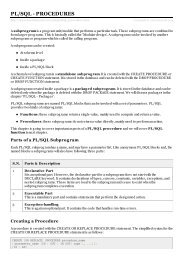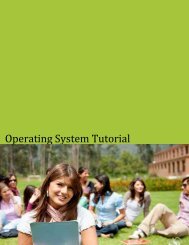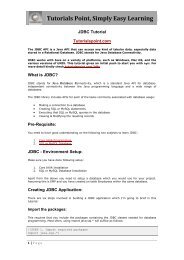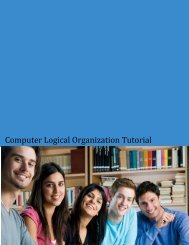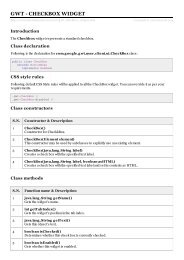download pascal tutorial (pdf - Tutorials Point
download pascal tutorial (pdf - Tutorials Point
download pascal tutorial (pdf - Tutorials Point
You also want an ePaper? Increase the reach of your titles
YUMPU automatically turns print PDFs into web optimized ePapers that Google loves.
CHAPTER<br />
17<br />
<strong>Point</strong>ers<br />
This section shows the concepts and usage of <strong>Point</strong>ers in Pascal:<br />
<strong>Point</strong>ers in Pascal are easy and fun to learn. Some Pascal programming tasks are<br />
performed more easily with pointers, and other tasks, such as dynamic memory<br />
allocation, cannot be performed without using pointers. So it becomes necessary to learn<br />
pointers to become a perfect Pascal programmer. Let's start learning them in simple and<br />
easy steps.<br />
As you know, every variable is a memory location and every memory location has its<br />
address defined which can be accessed using the name of the pointer variable, which<br />
denotes an address in memory.<br />
What Are <strong>Point</strong>ers?<br />
A pointer is a dynamic variable, whose value is the address of another variable, i.e., direct<br />
address of the memory location. Like any variable or constant, you must declare a pointer<br />
before you can use it to store any variable address. The general form of a pointer variable<br />
declaration is:<br />
type<br />
ptr-identifier = ^base-variable-type;<br />
The pointer type is defined by prefixing the up-arrow of caret symbol (^) with the base<br />
type. The base-type defines the types of the data items. Once a pointer variable is defined<br />
to be of certain type, it can point data items of that type only. Once a pointer type has<br />
been defined, we can use the var declaration to declare pointer variables.<br />
var<br />
p1, p2, ... : ptr-identifier;<br />
TUTORIALS POINT<br />
Simply Easy Learning Page 90



